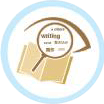Innovations in skills development
Improving Presentation Skills with OPTIMUS
It is important for students to be able to present well in English during their studies and for their post-tertiary careers. OPTIMUS (The Online Project for the Improvement of University Speaking) is a large UGC-funded project conducted collaboratively by HKU, CityU, and PolyU which seeks to address this need.
OPTIMUS is an online, self-access resource for Hong Kong students to help them improve their English presentation skills. Centred on a database of more than 60 authentic video samples, OPTIMUS includes presentations by both expert and peer presenters, in subjects from a full range of university disciplines. As well as the video presentations, OPTIMUS includes full transcripts of the presentations, which can be viewed as subtitles to the video, or as a text. As the viewer watches a presentation, OPTIMUS highlights key features of good presentations.
How can I use OPTIMUS?
The user interface allows you a large degree of independence to tailor usage to your preferred learning styles and needs. You can select to watch a complete presentation in your discipline, and the key features of good presentations are highlighted beneath the screen as the speaker performs them. Alternatively, you can choose only to watch examples of each of the key features:
- Articulating position/stance
- Audience rapport
- Explanation
- Eye contact
- Formality/register and choice of wording
- Gestures and body language
- Intonation and stress for key points
- Showing importance and/or relevance of content
- Signposting
- Specifying the theme and/or scope
- Visual aids
How will OPTIMUS help me?
The videos are all authentic presentations in a full range of disciplines, given by experts and peers at HKU, CityU, and PolyU. By watching examples of presentations, you will gain an understanding of what makes a good presentation in your discipline, and recognize the key techniques presenters employ to engage their audience.
Where do I find OPTIMUS?
Follow this link - http://optimus.hku.hk/home/ to watch your choice of more than 60 presentations. You can also find OPTIMUS in the Student Area of the ELC website.
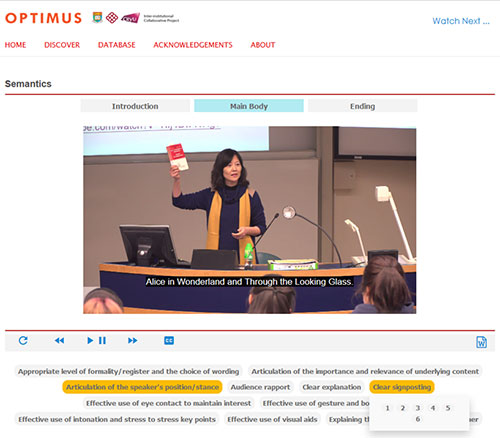
"Cirque du Self-Access": A Virtual Self-Access Centre in Second Life
By Dean A. F. Gui, Project Leader
Hong Kong is a city of conundrums and contradictions, noted for its technological advancements, yet also for its deeply rooted cultural conservatism. Its student population bears similar characteristics, being highly engrossed in social media and online gaming, but exhibiting reserved opinions regarding what technology should be integrated into their learning, and how this should be done. The HK PolyU Virtual Campus: An evolution in immersion, interaction and innovation (VCE3i) is a Teaching & Learning funded, small-scale project. Its membership includes the ELC (Project Lead), ENGL, SD, SHTM, COMP, and ITC. One of its main deliverables is a Virtual Self-Access Centre (VSAC), tentatively nicknamed “Cirque du Self-Access”, which aims to address this challenge by supplementing some of CILL’s services, while also offering services unique to the Second Life (SL) virtual environment: 24/7 accessibility; providing an alternative resource destination; and considering a learning space design that is both familiar and grounded. Aligning with the project’s objectives, students
- access the VSAC as an autonomous learning and resource gateway
- become interlocutors with each other, their teachers, and other virtual residents through live discourse using IM, text-chat or voice mediums
- approach material access and become content-creators in creative ways
The VCE3i offers interdisciplinary activities and systems for both students and faculty to collaborate with each other and to engage in interdisciplinary tasks that allow the user to imagine learning possibilities beyond her/his own immediate fields (see Fig. 1). To stay updated in the VSAC, please consider creating a Second Life account and visiting this website or staying tuned for upcoming 2017/2018 project announcements.
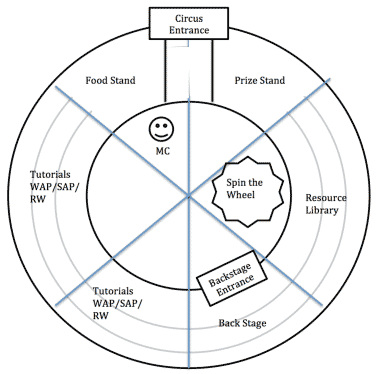
Fig. 1 – Cirque du Self-Access Layout
Spin-the-wheel features:
An MC static bot that delivers announcements upon touch.
The main VSAC collaborative activity, which is a large spin-the-wheel with 31 slots on it (representing every PolyU discipline).
- Upon touch, the wheel randomly spins to a discipline and opens up a relevant series of key words and phrases.
- The words and phrases are directly related to an independent language learning activity requiring students to visit different SL regions; the end product for the activities is a snapshot (taken by the student) and text (written by the student) entered on a virtual notecard.
- The student must go to the "Prize Stand" and submit the completed task.
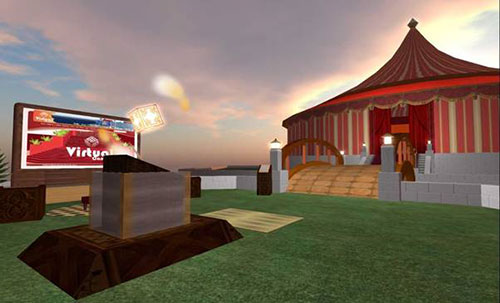
"Circus entrance" by Able Kwok Cheuk Lam
Creative Writing in English – A CAR Subject with EWR
Choose Creative Writing in English next term as your CAR subject with EWR if you would like to finish that semester as a novice author of a short story or a memoir!
One-hour lectures are reserved for essential input followed by selective and inspiring works of creative prose and poetry. A flipped-classroom strategy is used in the 2-hour weekly workshops with small groups so that class time can involve interaction with you about the stories and memoirs that you have created at home. Together, the teacher and students work closely on re-working and re-rendering your writing in a relaxed environment.
Feedback on writing is the mainstay of the Creative Writing in English course. Student writers are given immediate and continuous feedback on their work by the teacher and peers on aspects of their writing, in addition to the feedback provided on the EWR drafts. Each week develops a different aspect of the creative writing - Point of View, Character, Description/Narrative, Dialogue, Scene, Tone and Style, and Mood. Feedback on students’ work is related to these aspects.
Students are further trained to practice giving thorough feedback through a practice short story review task in which they give feedback in pairs on their peer’s short story, instead of on the book that they read for the Reading Requirement Assessment 3.
Research has shown that peer review and peer feedback is an effective way of developing accomplished writers (Ballantyne, Hughes & Mylonas, 2002). This makes students more critical of their own writing and thus helps them revise their own work more critically.
Join Creative Writing in English to hone your writing and create your very own short story or memoir!
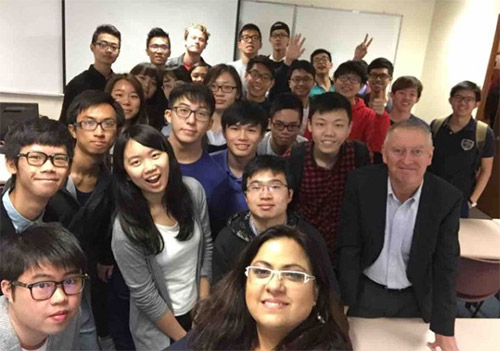
"Alphabet vs Aliens" App
The English Language Centre and the Excel@English Scheme have just launched their new mobile app: Alphabet vs Aliens @PolyU. This is a vocabulary-based English language-learning game in which players complete challenges by discovering words in a letter grid - the longer the word, the higher the score. At the end of each level, players are given the meaning of the words they have discovered.
In the story, a hostile alien force has invaded Earth, and intends to take over by ridding the world of all intelligentsia. Two PolyU students must race from department to department in an effort to warn the professors and help them escape before they are eliminated by the aliens.
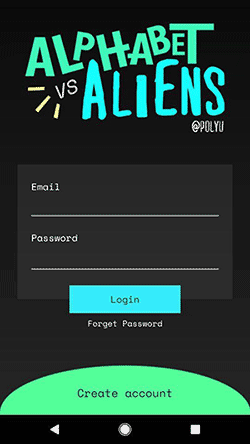
Alphabet Vs Aliens app screenshot
Alphabet vs. Aliens @PolyU is currently available on Android. iOS, Discipline specific vocabulary, and social media integration will be released at a later date.
To download the app, go to this link or scan the QR code below:
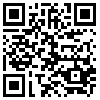
Share this page on:


